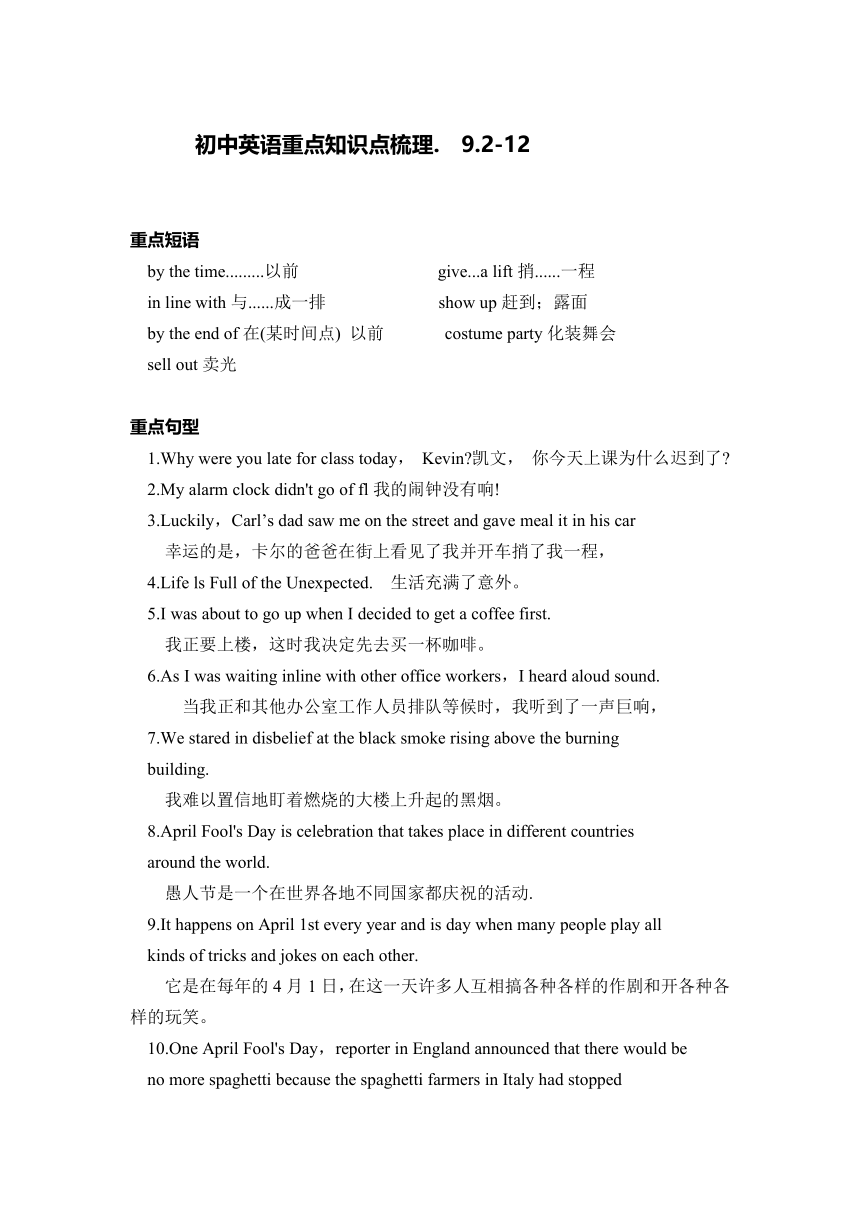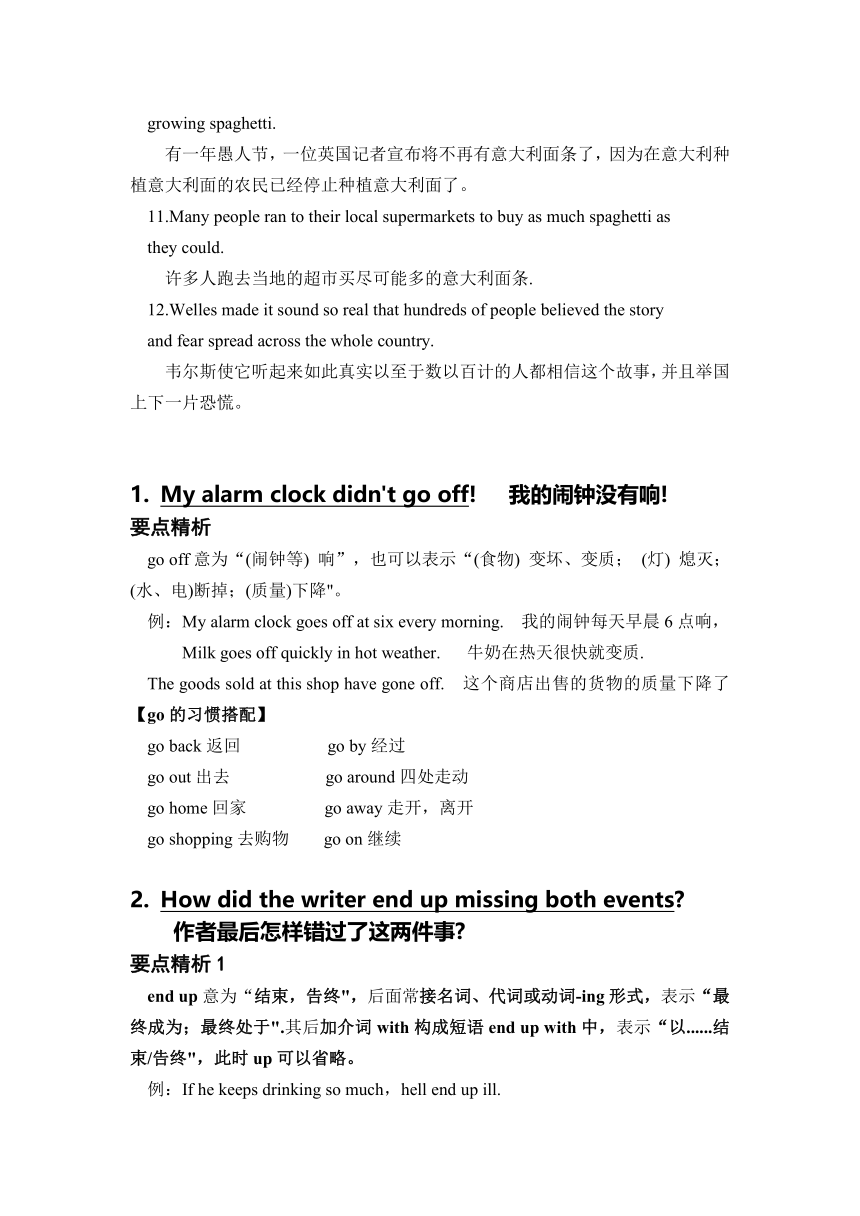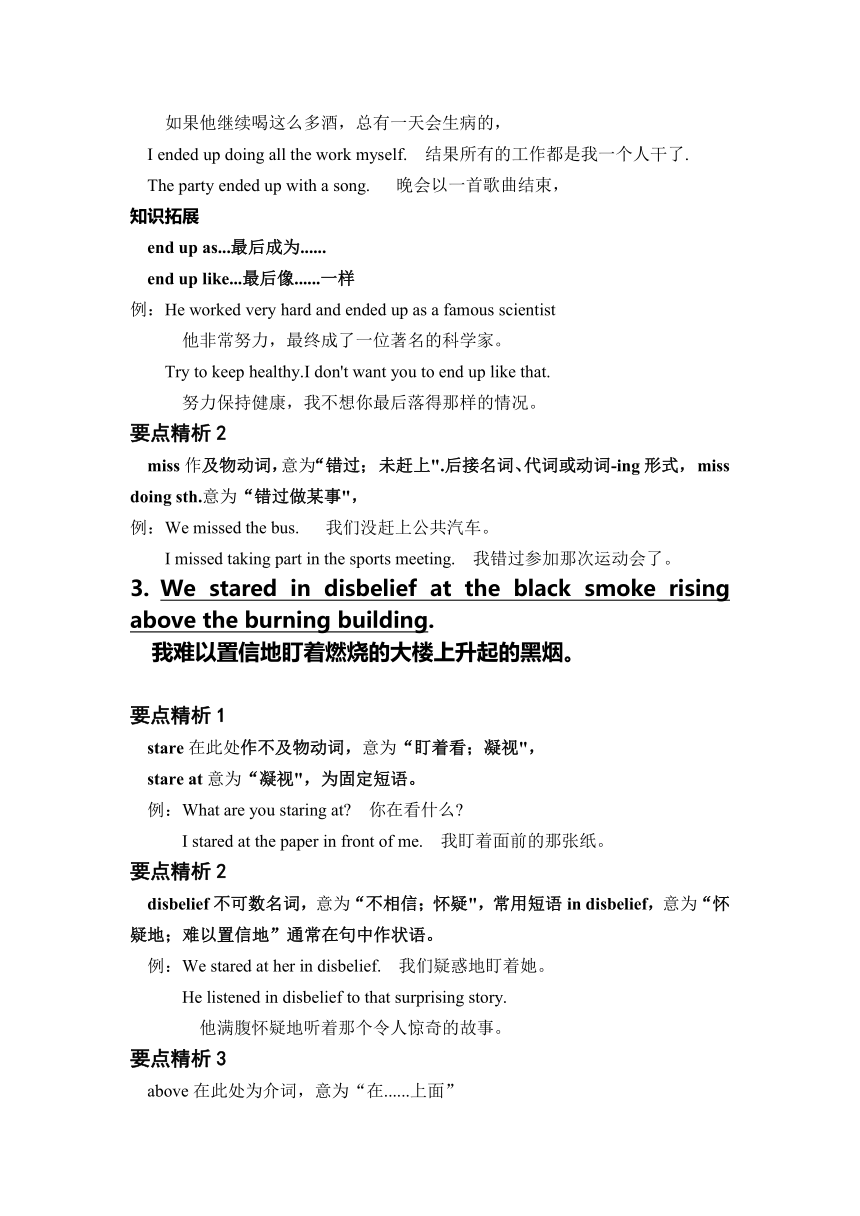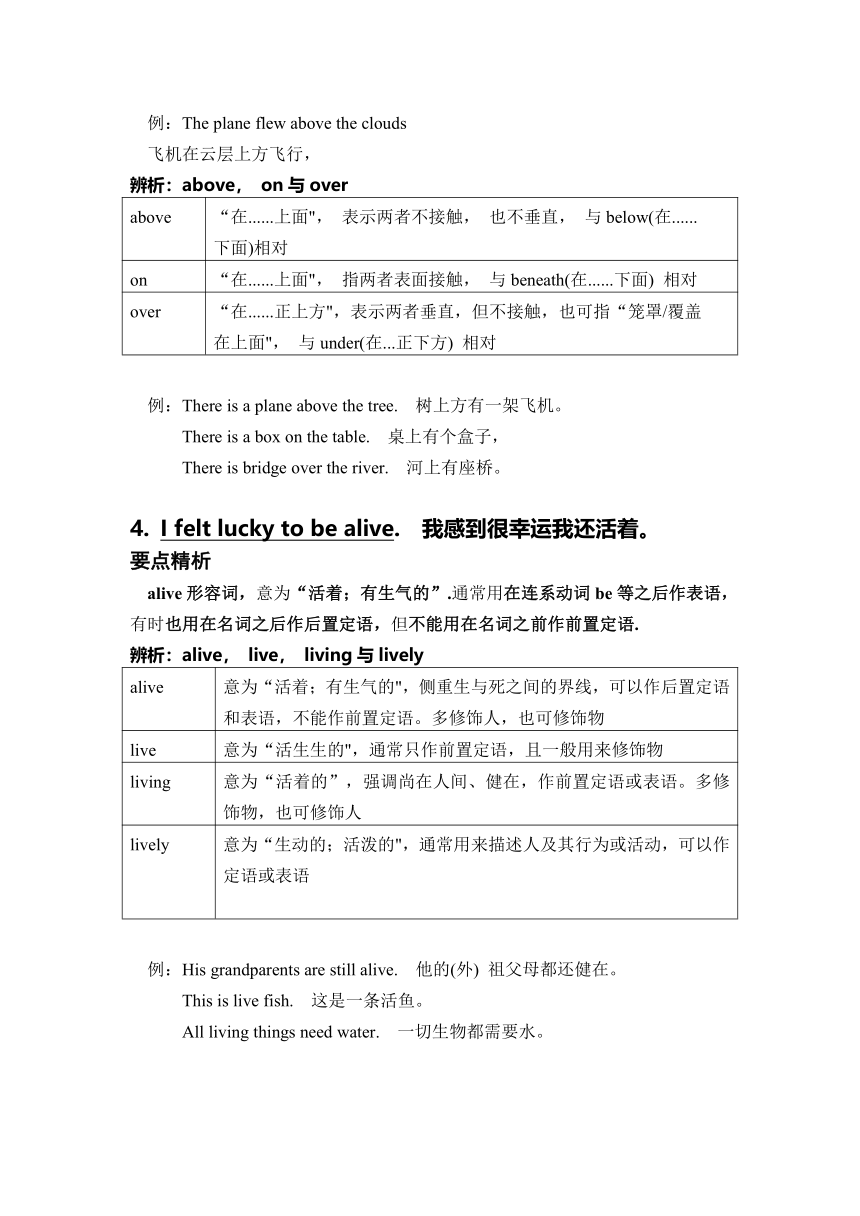人教版英语九年级全册 Unit 12 Life is full of the unexpected 讲义(知识梳理和练习)
文档属性
| 名称 | 人教版英语九年级全册 Unit 12 Life is full of the unexpected 讲义(知识梳理和练习) |

|
|
| 格式 | docx | ||
| 文件大小 | 45.7KB | ||
| 资源类型 | 教案 | ||
| 版本资源 | 人教新目标(Go for it)版 | ||
| 科目 | 英语 | ||
| 更新时间 | 2021-08-24 00:00:00 | ||
图片预览





文档简介
初中英语重点知识点梳理.
9.2-12
重点短语
by
the
time.........以前
give...a
lift捎......一程
in
line
with与......成一排
show
up赶到;露面
by
the
end
of在(某时间点)
以前
costume
party化装舞会
sell
out卖光
重点句型
1.Why
were
you
late
for
class
today,
Kevin?凯文,
你今天上课为什么迟到了?
2.My
alarm
clock
didn't
go
of
fl我的闹钟没有响!
3.Luckily,Carl’s
dad
saw
me
on
the
street
and
gave
meal
it
in
his
car
幸运的是,卡尔的爸爸在街上看见了我并开车捎了我一程,
4.Life
ls
Full
of
the
Unexpected.
生活充满了意外。
5.I
was
about
to
go
up
when
I
decided
to
get
a
coffee
first.
我正要上楼,这时我决定先去买一杯咖啡。
6.As
I
was
waiting
inline
with
other
office
workers,I
heard
aloud
sound.
当我正和其他办公室工作人员排队等候时,我听到了一声巨响,
7.We
stared
in
disbelief
at
the
black
smoke
rising
above
the
burning
building.
我难以置信地盯着燃烧的大楼上升起的黑烟。
8.April
Fool's
Day
is
celebration
that
takes
place
in
different
countries
around
the
world.
愚人节是一个在世界各地不同国家都庆祝的活动.
9.It
happens
on
April
1st
every
year
and
is
day
when
many
people
play
all
kinds
of
tricks
and
jokes
on
each
other.
它是在每年的4月1日,在这一天许多人互相搞各种各样的作剧和开各种各样的玩笑。
10.One
April
Fool's
Day,reporter
in
England
announced
that
there
would
be
no
more
spaghetti
because
the
spaghetti
farmers
in
Italy
had
stopped
growing
spaghetti.
有一年愚人节,一位英国记者宣布将不再有意大利面条了,因为在意大利种植意大利面的农民已经停止种植意大利面了。
11.Many
people
ran
to
their
local
supermarkets
to
buy
as
much
spaghetti
as
they
could.
许多人跑去当地的超市买尽可能多的意大利面条.
12.Welles
made
it
sound
so
real
that
hundreds
of
people
believed
the
story
and
fear
spread
across
the
whole
country.
韦尔斯使它听起来如此真实以至于数以百计的人都相信这个故事,并且举国上下一片恐慌。
My
alarm
clock
didn't
go
off!
我的闹钟没有响!
要点精析
go
off意为“(闹钟等)
响”,也可以表示“(食物)
变坏、变质;
(灯)
熄灭;
(水、电)断掉;(质量)下降"。
例:My
alarm
clock
goes
off
at
six
every
morning.
我的闹钟每天早晨6点响,
Milk
goes
off
quickly
in
hot
weather.
牛奶在热天很快就变质.
The
goods
sold
at
this
shop
have
gone
off.
这个商店出售的货物的质量下降了【go的习惯搭配】
go
back返回
go
by经过
go
out出去
go
around四处走动
go
home回家
go
away走开,离开
go
shopping去购物
go
on继续
How
did
the
writer
end
up
missing
both
events?
作者最后怎样错过了这两件事?
要点精析1
end
up意为“结束,告终",后面常接名词、代词或动词-ing形式,表示“最
终成为;最终处于".其后加介词with构成短语end
up
with中,表示“以......结束/告终",此时up可以省略。
例:If
he
keeps
drinking
so
much,hell
end
up
ill.
如果他继续喝这么多酒,总有一天会生病的,
I
ended
up
doing
all
the
work
myself.
结果所有的工作都是我一个人干了.
The
party
ended
up
with
a
song.
晚会以一首歌曲结束,
知识拓展
end
up
as...最后成为......
end
up
like...最后像......一样
例:He
worked
very
hard
and
ended
up
as
a
famous
scientist
他非常努力,最终成了一位著名的科学家。
Try
to
keep
healthy.I
don't
want
you
to
end
up
like
that.
努力保持健康,我不想你最后落得那样的情况。
要点精析2
miss作及物动词,意为“错过;
未赶上".后接名词、代词或动词-ing形式,
miss
doing
sth.意为“错过做某事",
例:We
missed
the
bus.
我们没赶上公共汽车。
I
missed
taking
part
in
the
sports
meeting.
我错过参加那次运动会了。
We
stared
in
disbelief
at
the
black
smoke
rising
above
the
burning
building.
我难以置信地盯着燃烧的大楼上升起的黑烟。
要点精析1
stare在此处作不及物动词,意为“盯着看;凝视",
stare
at意为“凝视",为固定短语。
例:What
are
you
staring
at?
你在看什么?
I
stared
at
the
paper
in
front
of
me.
我盯着面前的那张纸。
要点精析2
disbelief不可数名词,意为“不相信;怀疑",常用短语in
disbelief,意为“怀疑地;难以置信地”通常在句中作状语。
例:We
stared
at
her
in
disbelief.
我们疑惑地盯着她。
He
listened
in
disbelief
to
that
surprising
story.
他满腹怀疑地听着那个令人惊奇的故事。
要点精析3
above在此处为介词,意为“在......上面”
例:The
plane
flew
above
the
clouds
飞机在云层上方飞行,
辨析:above,
on与over
above
“在......上面",
表示两者不接触,
也不垂直,
与below(在......
下面)相对
on
“在......上面",
指两者表面接触,
与beneath(在......下面)
相对
over
“在......正上方",表示两者垂直,但不接触,也可指“笼罩/覆盖
在上面",
与under(在...正下方)
相对
例:There
is
a
plane
above
the
tree.
树上方有一架飞机。
There
is
a
box
on
the
table.
桌上有个盒子,
There
is
bridge
over
the
river.
河上有座桥。
I
felt
lucky
to
be
alive.
我感到很幸运我还活着。
要点精析
alive形容词,意为“活着;有生气的”.通常用在连系动词be等之后作表语,
有时也用在名词之后作后置定语,但不能用在名词之前作前置定语.
辨析:alive,
live,
living与lively
alive
意为“活着;有生气的",侧重生与死之间的界线,可以作后置定语
和表语,不能作前置定语。多修饰人,也可修饰物
live
意为“活生生的",通常只作前置定语,且一般用来修饰物
living
意为“活着的”,强调尚在人间、健在,作前置定语或表语。多修饰物,也可修饰人
lively
意为“生动的;活泼的",通常用来描述人及其行为或活动,可以作
定语或表语
例:His
grandparents
are
still
alive.
他的(外)
祖父母都还健在。
This
is
live
fish.
这是一条活鱼。
All
living
things
need
water.
一切生物都需要水。
By
the
end
of
the
school
day。
.....到的学校生活结束时......
要点精析
by
the
end
of意为“到......时为止,在......之前:到......结束时".其后若接表示将来的时间,句子常用将来完成时;若接表示过去的时间,句子常用过去完成时。
例:By
the
end
of
next
month,I
will
have
finished
reading
this
book
到下个月末,我将已读完这本书。
By
the
end
of
last
month,
I
had
planted
thousands
of
trees.
到上个月末,我已经种了数干棵树了。
知识拓展
①at
the
end
of表示“在......的末尾;
在......的尽头",
后可接时间和地点名词.
例:Were
going
to
have
a
trip
at
the
end
of
this
month.
在这个月末,我们打算去旅行。
②in
the
end意为“最后;
最终",
相当于at
last/finally.
例:In
the
end,he
worked
out
the
difficult
problem.
最后,他算出了那道难题。
fool
愚弄;
俊瓜
要点精析
①fool用作可数名词,意为“蠢人;傻瓜”,复数形式为fools,常用短语:make
fool
of...意为“取笑......,捉弄......".
例:I
felt
such
a
fool
when
I
realized
my
mistake.
当我意识到自己的错误时,我才感觉自己真是一个傻瓜。
Are
you
trying
to
make
fool
of
me?你想患弄我吗?
②fool用作动词,意为“愚弄,欺哄"。
例:Don't
be
fooled
by
the
salesman.
不要被这个推销员欺骗了。
知识拓属
fool的形容词为foolish,意为“患蠢的,荒谬的"。
例:I
was
foolish
enough
to
believe
what
he
said.
我太愚蠢了,竟然相信他说的话,
辨析:foolish,
silly与stupid
foolish
“蠢",
着重指缺乏智慧或判断力
silly
“傻",
着重指头脑简单、不懂事,
有单纯糊涂的意味
stupid
“笨",
着重指生理迟钝,
反应迟钝
例:She
was
foolish
enough
to
trust
him.
她蠢到竟然相信他。
I
feel
silly
in
this
dress.
穿这件衣服让我显得呆头呆脑。
How
could
you
be
so
stupid?
你怎么这么笨?
costume
服装;
装束
要点精析
costume名词,意为“服装;装束".指特定场合穿的衣服,如化装舞会时穿的服装、表演戏剧时穿的戏服或某一时代或某地特有的装束。
例:He
went
to
the
party
in
giant
chicken
costume.
他是打扮成一只大鸡去参加聚会的。
辨析:
costume,
cloth,
clothing与dress
costume
名词,意为“服装;装束".当指”戏装,化装服时,是可数名词
clothes
是最常用词,统指身上的各种服装,包括上衣、裤子、内衣等,是复数名词,
可与many,
few等词连用,但不能直接与数词连用,
“一套衣服”要说a
suit
of
clothes
clothing
是物质名词,是服装的总称,除衣裤外还包括帽子、鞋袜等,没有复数形式,“一件衣服”要说an
article
of
clothing
dress
范围较小,作可数名词时,指一件女服、连衣裙;作不可数名词时,指某种特殊衣服,尤指在社交场合穿的衣服
例:The
girl
designed
costumes
for
a
famous
singe
这个女孩儿为一位有名的歌手设计服装。
The
clothes
in
this
shop
are
very
beautiful.
这家商店的衣服非常漂亮。
We
have
to
put
on
warm
clothing
in
winter.
冬天我们不得不穿上暖和的衣服。
She
wears
a
beautiful
evening
dress.
她穿着一件漂亮的晚礼服。
The
lady
was
so
happy
because
she
really
wanted
to
get
married.
这位女士很高兴,因为她真的很想结婚。
要点精析
get
married意为“结婚”,表示结婚的动作,不能和表示一段时间的状语连用。marry动词意为“结婚”。
例:Lucy
and
Peter
got
married
last
week.
露西和彼得上周结婚了,
She
married
a
policeman
last
month.
她上个月嫁给了一名警察,
知识拓展
marry的其他用法:
①marry在多数情况下是及物动词,
需要直接接宾语,
即marry
sb.,
意为“和某人结婚;婴某人;嫁给某人".
例:He
is
going
to
marry
Jane.他将娶简。
②marry可作不及物动词,
意为“结婚”.
例:She
wouldn't
marry
again.她不会再结了,
③be
married(ts.)
(不能用with
sb.)
表示已婚的状态,
可以和表示一段时间的状语连用。
例:She
has
been
married
to
him
for
five
years.她已经嫁给他5年了,
By
the
time
police
officers
told
the
country
that
the
story
was
a
hoax,many
people
had
runaway
from
their
homes.
当警官告诉全国的人们这个故事是一个骗局时,许多人已经逃离了他们的家园。
要点精析
runaway
from意为“从......逃脱;回避;逃避";runaway意为“逃跑;逃脱”.
例:It's
best
not
to
runaway
from
your
problems.
最好不要逃避你的问题。
The
teenager
ran
away
after
being
punished.
那个青少年受到惩罚之后就逃跑了。
[习惯搭配】
in
the
long/short
run从长期/短期看
run
across偶然碰见
run
after追赶;追捕;跟踪
run
into撞上;遇到
run
for竞选
run
out
of用尽;
用完
即学即试
一、单项选择
1.________the
time
l
got
to
the
bus
stop,the
bus
had
already
left.
A.On
B.In
C.By
D.With
2.-Show
me
your
homework,Dave.
-Sorry,Mrs.Brown.
I’ve________
it
at
home.
A.missed
B.forgotten
C.lost
D.left
3.We're
waiting
for
him,but
he
hasn't________yet.
A.show
up
B.shown
up
C.show
around
D.showed
around
4.A
big
supermarket
will
be
built________the
road
next
year.
A.by
the
end
of
B.at
the
end
of
C.in
the
end
of
D.in
the
end
5.-What's
this?
-Oh,my
God!
It's
a
gift
for
James.
I
forgot________it
this
afternoon.
A.to
post
B.posting
C.post
D.posts
6.We
walked________
it
got
dark.
A.if
B.where
C.till
D.what
7.Jack________the
8:30
train
and
he
had
to
wait
for
the
next
one.
A.missed
B.lost
C.caught
D.took
8.I
saw
the
moon
move________
the
roof.
A.on
B.above
C.below
D.over
9.Harry
has
decided________
an
online
shop
after
graduating
from
school.
A.open
B.to
open
C.opened
D.opening
10.I
was
about________
to
bed________
the
bell
rang.
A.go;
when
B.to
go;
then
C.to
go;
when
D.go;
then
11.Catherine
got
married________a
policeman
twenty
years
ago.
A.with
B.for
C.to
D.of
12.When
he
arrived
at
the
airport,Jones
found
that________fans
were
waiting
for
him
there.
A.hundred
B.hundreds
C.hundred
of
D.hundreds
of
13.Students
began
to
laugh
at
the
crazy________
.
A.discovery
B.discover
C.discovers
D.discovered
14.If
you're
not
free,I'm
afraid
we
have
to________
the
party
tonight.
A.cancel
B.announce
C.hold
D.stop
15.Lucy
is
shy.
She
would
not
invite
her
classmates
_________dancing
with
her.
A.practice
B.practices
C.practicing
D.to
practice
16.-Tony
is
still
in
bed.
He
may
miss
the
school
bus.
-Last
night
he________
late
to
write
the
report
of
his
survey.
A.stayed
up
B.woke
up
C.got
up
D.held
up
17.When
turned
around,he________
in
the
forest.
A.has
appeared
B.appeared
C.disappeared
D.had
disappeared
18.We've_________all
the
CDs
and
they__________well.
A.sell
out;
are
sold
B.sold
out;
are
sold
C.sell
out;
sell
D.sold
out;
sell
19.-________________?
-I
couldn’t
find
my
sister.
A.What
else
B.What
other
things
C.What
happened
D.What
matter
20.-Tom,________
you
ever________your
key?
-Not
yet.
A.did;
find
B.do;
found
C.have;
found
D.has;
found
21.The
meeting
__________
by
the
time
l
got
there
yesterday.
A.was
on
B.has
been
on
C.had
begun
D.has
begun
22.
-Oh,my
God!
I_________
my
notebook
in
my
bedroom.
-It
doesn't
matter.
I’ll
end
you
mine.
A.forget
B.forgot
C.leave
D.left
23.
Don’t
be
late
________
class,We
must
be
on
time.
A.for
B.to
C.in
解析:be
late
for为固定短语,
意为“迟到”,
故选A.
24.-Waiter,I
ordered
beef
noodles,but
I
can't
see
any
beef
in
the
noodles!
-________
your
glasses
and
you
can
see
the
beef.
A.Put
off
B.Put
up
C.Put
on
D.Put
into
25.
I
fell
off
the
bike
on
my
way
to
school.
_________,wasn't
hurt.
A.Luckily
B.Suddenly
C.Politely
D.Recently
26.
Ice
is
not
often
seen
herein
winter
as
the
temperature
normally
stays________zero.
A.up
B.down
C.above
D.below
27.
-What’s
wrong
with
you,Eric?
You
look
tired.
-I_________to
prepare
for
the
final
exam
last
night.
A.picked
up
B.woke
up
C.stayed
up
D.put
up
28.-I'm
sorry,Mr
L
i
I_________my
English
homework
at
home.
-Don't
forget_________it
to
school
tomorrow.
A.left;
to
bring
B.forgot;
to
take
C.lost;
to
bring
29.He_________for
ten
years.
A.has
been
married
B.married
C.got
married
D.has
married
即学即试参考答案与解析
I.1.C句意:当我到公共汽车停靠站时,
公共汽车已经开走了,
by
the
time意为
“到......时为止,在......以前”,是固定短语,
2.D指“遗忘”时,
leave后常接地点状语,
而forget不具体说明地点,
由空格后at
home可知选D.
3.B根据has
n't和yet可判断子用现在完成时,
故可排除A、C两项;
show
up意为“露面";
show
around短语不正确,
shows
b.around意为“带领某人参观",句意为“我们在等他,
但是他还没有出现”。show的过去分词有两个,
showed和shown.
4.B
by
the
end
of意为“在.......结来之前";
at
the
end
of意为“在.......的末尾;
在......的尽头";
in
the
end
of短语有误;
in
the
end意为“最后”,
由句意“明年在这条路的尽头要建一个大超市”可知选B,
5.A
forget
todos
th.意为“忘记要做某事
,
指事情还没有做;
forget
doing
sth.意为“忘记做过某事”指事情已经做了。句意:“这是什么?”“噢,我的天哪!这是给詹姆斯的礼物。今天下午我忘了寄走它.”由此可知post(寄)
这一动作并未发生,
应使用forget
todos
th.,
故选A.
6.C根据选项和题干可知句意为“我们一直走到天黑".表示“直到......为止”用till/until都可。故选C,
7.A
miss意为“错过;
遗漏";
lose意为“丢失";
catch意为“赶上;
抓住;
take意为“拿走",根据后半句句意“他不得不等待下一辆”说明“他错过了8:30的火车",故选A.
8.B句意为“我看到月亮在屋顶上方移动",“月亮”与“屋顶”不垂直,不接触,故用above
9.B
decide
todos
th.为固定用法,
意为“决定做某事",
故选B,
句意:哈利已经决定从学校毕业后开一家网店。”
10.C
be
about
todos
th.when....表示“正要做某事时",
浏览各选项可知C项正确。句意为“我正要上床睡觉时,门铃响了"
11.C
get
married
to
sb.意为“嫁给某人;
与某人结婚",
为固定短语,
故选C.
12.D
hundred前有具体数字修饰时,
表示确切数目;
hundred前无具体数字修饰时,常用hundreds,
且与of连用,
此时表示概数。该题空格前无具体数字,
故选D
句意:当李敏到达机场时,他发现数百名粉丝正在那里等着他.
13.A根据形容词crazy可知其后接名词;
浏览各选项可知discovery是名词;
discover是动词原形;
discovers是动词的第三人称单数形式;
discovered是动词的过去式。故选A,
14.A句意为“如果你没有空,
恐怕我们今晚必须取消这次宴会了"。cancel意为“取消":announce意为“宣布";
hold意为“举行";
stop意为“停止”.A项符合句意,故选A,
15.D
invites
b.todos
th.意为“邀请某人做某事”故选D.
16.A
stay
up”熬夜;
wakeup“醒来";
get
up”起床";
holdup“举起;
支撑。
由上面两句“托尼还在床上睡觉。他也许会错过校车,”可知下句句意为“昨晚他熬夜到很晚写调查报告”,故选A.
17.D根据从句发生的时间是过去可知主句的动作是过去的过去,用过去完成时,故选D,句意为“当我转过身时,他已消失在森林中".
18.D句意为“我们已经卖完了所有的唱片,
它们很好卖".“have+过去分词”是现在完成时的构成形式,
排除A、C两项;
表示销售情况时,
sell的主动形式表示被动意义,排除B项。
19.C根据答语“我找不到我妹妹了。”可知问句询问“怎么了?“,而A、B两项意为“其他什么事?”不符合语境;D项表述错误。故选C。
20.C根据答语Not
yet.可知问句的时态用现在完成时;
主语you是第二人称,
用助动词have,
故选C,
句意:“汤姆,
你找到你的钥匙了吗?”“还没。”
21.C
22.D
23.A
24.C
25.A
26.C
27.C
28.A
29.A
9.2-12
重点短语
by
the
time.........以前
give...a
lift捎......一程
in
line
with与......成一排
show
up赶到;露面
by
the
end
of在(某时间点)
以前
costume
party化装舞会
sell
out卖光
重点句型
1.Why
were
you
late
for
class
today,
Kevin?凯文,
你今天上课为什么迟到了?
2.My
alarm
clock
didn't
go
of
fl我的闹钟没有响!
3.Luckily,Carl’s
dad
saw
me
on
the
street
and
gave
meal
it
in
his
car
幸运的是,卡尔的爸爸在街上看见了我并开车捎了我一程,
4.Life
ls
Full
of
the
Unexpected.
生活充满了意外。
5.I
was
about
to
go
up
when
I
decided
to
get
a
coffee
first.
我正要上楼,这时我决定先去买一杯咖啡。
6.As
I
was
waiting
inline
with
other
office
workers,I
heard
aloud
sound.
当我正和其他办公室工作人员排队等候时,我听到了一声巨响,
7.We
stared
in
disbelief
at
the
black
smoke
rising
above
the
burning
building.
我难以置信地盯着燃烧的大楼上升起的黑烟。
8.April
Fool's
Day
is
celebration
that
takes
place
in
different
countries
around
the
world.
愚人节是一个在世界各地不同国家都庆祝的活动.
9.It
happens
on
April
1st
every
year
and
is
day
when
many
people
play
all
kinds
of
tricks
and
jokes
on
each
other.
它是在每年的4月1日,在这一天许多人互相搞各种各样的作剧和开各种各样的玩笑。
10.One
April
Fool's
Day,reporter
in
England
announced
that
there
would
be
no
more
spaghetti
because
the
spaghetti
farmers
in
Italy
had
stopped
growing
spaghetti.
有一年愚人节,一位英国记者宣布将不再有意大利面条了,因为在意大利种植意大利面的农民已经停止种植意大利面了。
11.Many
people
ran
to
their
local
supermarkets
to
buy
as
much
spaghetti
as
they
could.
许多人跑去当地的超市买尽可能多的意大利面条.
12.Welles
made
it
sound
so
real
that
hundreds
of
people
believed
the
story
and
fear
spread
across
the
whole
country.
韦尔斯使它听起来如此真实以至于数以百计的人都相信这个故事,并且举国上下一片恐慌。
My
alarm
clock
didn't
go
off!
我的闹钟没有响!
要点精析
go
off意为“(闹钟等)
响”,也可以表示“(食物)
变坏、变质;
(灯)
熄灭;
(水、电)断掉;(质量)下降"。
例:My
alarm
clock
goes
off
at
six
every
morning.
我的闹钟每天早晨6点响,
Milk
goes
off
quickly
in
hot
weather.
牛奶在热天很快就变质.
The
goods
sold
at
this
shop
have
gone
off.
这个商店出售的货物的质量下降了【go的习惯搭配】
go
back返回
go
by经过
go
out出去
go
around四处走动
go
home回家
go
away走开,离开
go
shopping去购物
go
on继续
How
did
the
writer
end
up
missing
both
events?
作者最后怎样错过了这两件事?
要点精析1
end
up意为“结束,告终",后面常接名词、代词或动词-ing形式,表示“最
终成为;最终处于".其后加介词with构成短语end
up
with中,表示“以......结束/告终",此时up可以省略。
例:If
he
keeps
drinking
so
much,hell
end
up
ill.
如果他继续喝这么多酒,总有一天会生病的,
I
ended
up
doing
all
the
work
myself.
结果所有的工作都是我一个人干了.
The
party
ended
up
with
a
song.
晚会以一首歌曲结束,
知识拓展
end
up
as...最后成为......
end
up
like...最后像......一样
例:He
worked
very
hard
and
ended
up
as
a
famous
scientist
他非常努力,最终成了一位著名的科学家。
Try
to
keep
healthy.I
don't
want
you
to
end
up
like
that.
努力保持健康,我不想你最后落得那样的情况。
要点精析2
miss作及物动词,意为“错过;
未赶上".后接名词、代词或动词-ing形式,
miss
doing
sth.意为“错过做某事",
例:We
missed
the
bus.
我们没赶上公共汽车。
I
missed
taking
part
in
the
sports
meeting.
我错过参加那次运动会了。
We
stared
in
disbelief
at
the
black
smoke
rising
above
the
burning
building.
我难以置信地盯着燃烧的大楼上升起的黑烟。
要点精析1
stare在此处作不及物动词,意为“盯着看;凝视",
stare
at意为“凝视",为固定短语。
例:What
are
you
staring
at?
你在看什么?
I
stared
at
the
paper
in
front
of
me.
我盯着面前的那张纸。
要点精析2
disbelief不可数名词,意为“不相信;怀疑",常用短语in
disbelief,意为“怀疑地;难以置信地”通常在句中作状语。
例:We
stared
at
her
in
disbelief.
我们疑惑地盯着她。
He
listened
in
disbelief
to
that
surprising
story.
他满腹怀疑地听着那个令人惊奇的故事。
要点精析3
above在此处为介词,意为“在......上面”
例:The
plane
flew
above
the
clouds
飞机在云层上方飞行,
辨析:above,
on与over
above
“在......上面",
表示两者不接触,
也不垂直,
与below(在......
下面)相对
on
“在......上面",
指两者表面接触,
与beneath(在......下面)
相对
over
“在......正上方",表示两者垂直,但不接触,也可指“笼罩/覆盖
在上面",
与under(在...正下方)
相对
例:There
is
a
plane
above
the
tree.
树上方有一架飞机。
There
is
a
box
on
the
table.
桌上有个盒子,
There
is
bridge
over
the
river.
河上有座桥。
I
felt
lucky
to
be
alive.
我感到很幸运我还活着。
要点精析
alive形容词,意为“活着;有生气的”.通常用在连系动词be等之后作表语,
有时也用在名词之后作后置定语,但不能用在名词之前作前置定语.
辨析:alive,
live,
living与lively
alive
意为“活着;有生气的",侧重生与死之间的界线,可以作后置定语
和表语,不能作前置定语。多修饰人,也可修饰物
live
意为“活生生的",通常只作前置定语,且一般用来修饰物
living
意为“活着的”,强调尚在人间、健在,作前置定语或表语。多修饰物,也可修饰人
lively
意为“生动的;活泼的",通常用来描述人及其行为或活动,可以作
定语或表语
例:His
grandparents
are
still
alive.
他的(外)
祖父母都还健在。
This
is
live
fish.
这是一条活鱼。
All
living
things
need
water.
一切生物都需要水。
By
the
end
of
the
school
day。
.....到的学校生活结束时......
要点精析
by
the
end
of意为“到......时为止,在......之前:到......结束时".其后若接表示将来的时间,句子常用将来完成时;若接表示过去的时间,句子常用过去完成时。
例:By
the
end
of
next
month,I
will
have
finished
reading
this
book
到下个月末,我将已读完这本书。
By
the
end
of
last
month,
I
had
planted
thousands
of
trees.
到上个月末,我已经种了数干棵树了。
知识拓展
①at
the
end
of表示“在......的末尾;
在......的尽头",
后可接时间和地点名词.
例:Were
going
to
have
a
trip
at
the
end
of
this
month.
在这个月末,我们打算去旅行。
②in
the
end意为“最后;
最终",
相当于at
last/finally.
例:In
the
end,he
worked
out
the
difficult
problem.
最后,他算出了那道难题。
fool
愚弄;
俊瓜
要点精析
①fool用作可数名词,意为“蠢人;傻瓜”,复数形式为fools,常用短语:make
fool
of...意为“取笑......,捉弄......".
例:I
felt
such
a
fool
when
I
realized
my
mistake.
当我意识到自己的错误时,我才感觉自己真是一个傻瓜。
Are
you
trying
to
make
fool
of
me?你想患弄我吗?
②fool用作动词,意为“愚弄,欺哄"。
例:Don't
be
fooled
by
the
salesman.
不要被这个推销员欺骗了。
知识拓属
fool的形容词为foolish,意为“患蠢的,荒谬的"。
例:I
was
foolish
enough
to
believe
what
he
said.
我太愚蠢了,竟然相信他说的话,
辨析:foolish,
silly与stupid
foolish
“蠢",
着重指缺乏智慧或判断力
silly
“傻",
着重指头脑简单、不懂事,
有单纯糊涂的意味
stupid
“笨",
着重指生理迟钝,
反应迟钝
例:She
was
foolish
enough
to
trust
him.
她蠢到竟然相信他。
I
feel
silly
in
this
dress.
穿这件衣服让我显得呆头呆脑。
How
could
you
be
so
stupid?
你怎么这么笨?
costume
服装;
装束
要点精析
costume名词,意为“服装;装束".指特定场合穿的衣服,如化装舞会时穿的服装、表演戏剧时穿的戏服或某一时代或某地特有的装束。
例:He
went
to
the
party
in
giant
chicken
costume.
他是打扮成一只大鸡去参加聚会的。
辨析:
costume,
cloth,
clothing与dress
costume
名词,意为“服装;装束".当指”戏装,化装服时,是可数名词
clothes
是最常用词,统指身上的各种服装,包括上衣、裤子、内衣等,是复数名词,
可与many,
few等词连用,但不能直接与数词连用,
“一套衣服”要说a
suit
of
clothes
clothing
是物质名词,是服装的总称,除衣裤外还包括帽子、鞋袜等,没有复数形式,“一件衣服”要说an
article
of
clothing
dress
范围较小,作可数名词时,指一件女服、连衣裙;作不可数名词时,指某种特殊衣服,尤指在社交场合穿的衣服
例:The
girl
designed
costumes
for
a
famous
singe
这个女孩儿为一位有名的歌手设计服装。
The
clothes
in
this
shop
are
very
beautiful.
这家商店的衣服非常漂亮。
We
have
to
put
on
warm
clothing
in
winter.
冬天我们不得不穿上暖和的衣服。
She
wears
a
beautiful
evening
dress.
她穿着一件漂亮的晚礼服。
The
lady
was
so
happy
because
she
really
wanted
to
get
married.
这位女士很高兴,因为她真的很想结婚。
要点精析
get
married意为“结婚”,表示结婚的动作,不能和表示一段时间的状语连用。marry动词意为“结婚”。
例:Lucy
and
Peter
got
married
last
week.
露西和彼得上周结婚了,
She
married
a
policeman
last
month.
她上个月嫁给了一名警察,
知识拓展
marry的其他用法:
①marry在多数情况下是及物动词,
需要直接接宾语,
即marry
sb.,
意为“和某人结婚;婴某人;嫁给某人".
例:He
is
going
to
marry
Jane.他将娶简。
②marry可作不及物动词,
意为“结婚”.
例:She
wouldn't
marry
again.她不会再结了,
③be
married(ts.)
(不能用with
sb.)
表示已婚的状态,
可以和表示一段时间的状语连用。
例:She
has
been
married
to
him
for
five
years.她已经嫁给他5年了,
By
the
time
police
officers
told
the
country
that
the
story
was
a
hoax,many
people
had
runaway
from
their
homes.
当警官告诉全国的人们这个故事是一个骗局时,许多人已经逃离了他们的家园。
要点精析
runaway
from意为“从......逃脱;回避;逃避";runaway意为“逃跑;逃脱”.
例:It's
best
not
to
runaway
from
your
problems.
最好不要逃避你的问题。
The
teenager
ran
away
after
being
punished.
那个青少年受到惩罚之后就逃跑了。
[习惯搭配】
in
the
long/short
run从长期/短期看
run
across偶然碰见
run
after追赶;追捕;跟踪
run
into撞上;遇到
run
for竞选
run
out
of用尽;
用完
即学即试
一、单项选择
1.________the
time
l
got
to
the
bus
stop,the
bus
had
already
left.
A.On
B.In
C.By
D.With
2.-Show
me
your
homework,Dave.
-Sorry,Mrs.Brown.
I’ve________
it
at
home.
A.missed
B.forgotten
C.lost
D.left
3.We're
waiting
for
him,but
he
hasn't________yet.
A.show
up
B.shown
up
C.show
around
D.showed
around
4.A
big
supermarket
will
be
built________the
road
next
year.
A.by
the
end
of
B.at
the
end
of
C.in
the
end
of
D.in
the
end
5.-What's
this?
-Oh,my
God!
It's
a
gift
for
James.
I
forgot________it
this
afternoon.
A.to
post
B.posting
C.post
D.posts
6.We
walked________
it
got
dark.
A.if
B.where
C.till
D.what
7.Jack________the
8:30
train
and
he
had
to
wait
for
the
next
one.
A.missed
B.lost
C.caught
D.took
8.I
saw
the
moon
move________
the
roof.
A.on
B.above
C.below
D.over
9.Harry
has
decided________
an
online
shop
after
graduating
from
school.
A.open
B.to
open
C.opened
D.opening
10.I
was
about________
to
bed________
the
bell
rang.
A.go;
when
B.to
go;
then
C.to
go;
when
D.go;
then
11.Catherine
got
married________a
policeman
twenty
years
ago.
A.with
B.for
C.to
D.of
12.When
he
arrived
at
the
airport,Jones
found
that________fans
were
waiting
for
him
there.
A.hundred
B.hundreds
C.hundred
of
D.hundreds
of
13.Students
began
to
laugh
at
the
crazy________
.
A.discovery
B.discover
C.discovers
D.discovered
14.If
you're
not
free,I'm
afraid
we
have
to________
the
party
tonight.
A.cancel
B.announce
C.hold
D.stop
15.Lucy
is
shy.
She
would
not
invite
her
classmates
_________dancing
with
her.
A.practice
B.practices
C.practicing
D.to
practice
16.-Tony
is
still
in
bed.
He
may
miss
the
school
bus.
-Last
night
he________
late
to
write
the
report
of
his
survey.
A.stayed
up
B.woke
up
C.got
up
D.held
up
17.When
turned
around,he________
in
the
forest.
A.has
appeared
B.appeared
C.disappeared
D.had
disappeared
18.We've_________all
the
CDs
and
they__________well.
A.sell
out;
are
sold
B.sold
out;
are
sold
C.sell
out;
sell
D.sold
out;
sell
19.-________________?
-I
couldn’t
find
my
sister.
A.What
else
B.What
other
things
C.What
happened
D.What
matter
20.-Tom,________
you
ever________your
key?
-Not
yet.
A.did;
find
B.do;
found
C.have;
found
D.has;
found
21.The
meeting
__________
by
the
time
l
got
there
yesterday.
A.was
on
B.has
been
on
C.had
begun
D.has
begun
22.
-Oh,my
God!
I_________
my
notebook
in
my
bedroom.
-It
doesn't
matter.
I’ll
end
you
mine.
A.forget
B.forgot
C.leave
D.left
23.
Don’t
be
late
________
class,We
must
be
on
time.
A.for
B.to
C.in
解析:be
late
for为固定短语,
意为“迟到”,
故选A.
24.-Waiter,I
ordered
beef
noodles,but
I
can't
see
any
beef
in
the
noodles!
-________
your
glasses
and
you
can
see
the
beef.
A.Put
off
B.Put
up
C.Put
on
D.Put
into
25.
I
fell
off
the
bike
on
my
way
to
school.
_________,wasn't
hurt.
A.Luckily
B.Suddenly
C.Politely
D.Recently
26.
Ice
is
not
often
seen
herein
winter
as
the
temperature
normally
stays________zero.
A.up
B.down
C.above
D.below
27.
-What’s
wrong
with
you,Eric?
You
look
tired.
-I_________to
prepare
for
the
final
exam
last
night.
A.picked
up
B.woke
up
C.stayed
up
D.put
up
28.-I'm
sorry,Mr
L
i
I_________my
English
homework
at
home.
-Don't
forget_________it
to
school
tomorrow.
A.left;
to
bring
B.forgot;
to
take
C.lost;
to
bring
29.He_________for
ten
years.
A.has
been
married
B.married
C.got
married
D.has
married
即学即试参考答案与解析
I.1.C句意:当我到公共汽车停靠站时,
公共汽车已经开走了,
by
the
time意为
“到......时为止,在......以前”,是固定短语,
2.D指“遗忘”时,
leave后常接地点状语,
而forget不具体说明地点,
由空格后at
home可知选D.
3.B根据has
n't和yet可判断子用现在完成时,
故可排除A、C两项;
show
up意为“露面";
show
around短语不正确,
shows
b.around意为“带领某人参观",句意为“我们在等他,
但是他还没有出现”。show的过去分词有两个,
showed和shown.
4.B
by
the
end
of意为“在.......结来之前";
at
the
end
of意为“在.......的末尾;
在......的尽头";
in
the
end
of短语有误;
in
the
end意为“最后”,
由句意“明年在这条路的尽头要建一个大超市”可知选B,
5.A
forget
todos
th.意为“忘记要做某事
,
指事情还没有做;
forget
doing
sth.意为“忘记做过某事”指事情已经做了。句意:“这是什么?”“噢,我的天哪!这是给詹姆斯的礼物。今天下午我忘了寄走它.”由此可知post(寄)
这一动作并未发生,
应使用forget
todos
th.,
故选A.
6.C根据选项和题干可知句意为“我们一直走到天黑".表示“直到......为止”用till/until都可。故选C,
7.A
miss意为“错过;
遗漏";
lose意为“丢失";
catch意为“赶上;
抓住;
take意为“拿走",根据后半句句意“他不得不等待下一辆”说明“他错过了8:30的火车",故选A.
8.B句意为“我看到月亮在屋顶上方移动",“月亮”与“屋顶”不垂直,不接触,故用above
9.B
decide
todos
th.为固定用法,
意为“决定做某事",
故选B,
句意:哈利已经决定从学校毕业后开一家网店。”
10.C
be
about
todos
th.when....表示“正要做某事时",
浏览各选项可知C项正确。句意为“我正要上床睡觉时,门铃响了"
11.C
get
married
to
sb.意为“嫁给某人;
与某人结婚",
为固定短语,
故选C.
12.D
hundred前有具体数字修饰时,
表示确切数目;
hundred前无具体数字修饰时,常用hundreds,
且与of连用,
此时表示概数。该题空格前无具体数字,
故选D
句意:当李敏到达机场时,他发现数百名粉丝正在那里等着他.
13.A根据形容词crazy可知其后接名词;
浏览各选项可知discovery是名词;
discover是动词原形;
discovers是动词的第三人称单数形式;
discovered是动词的过去式。故选A,
14.A句意为“如果你没有空,
恐怕我们今晚必须取消这次宴会了"。cancel意为“取消":announce意为“宣布";
hold意为“举行";
stop意为“停止”.A项符合句意,故选A,
15.D
invites
b.todos
th.意为“邀请某人做某事”故选D.
16.A
stay
up”熬夜;
wakeup“醒来";
get
up”起床";
holdup“举起;
支撑。
由上面两句“托尼还在床上睡觉。他也许会错过校车,”可知下句句意为“昨晚他熬夜到很晚写调查报告”,故选A.
17.D根据从句发生的时间是过去可知主句的动作是过去的过去,用过去完成时,故选D,句意为“当我转过身时,他已消失在森林中".
18.D句意为“我们已经卖完了所有的唱片,
它们很好卖".“have+过去分词”是现在完成时的构成形式,
排除A、C两项;
表示销售情况时,
sell的主动形式表示被动意义,排除B项。
19.C根据答语“我找不到我妹妹了。”可知问句询问“怎么了?“,而A、B两项意为“其他什么事?”不符合语境;D项表述错误。故选C。
20.C根据答语Not
yet.可知问句的时态用现在完成时;
主语you是第二人称,
用助动词have,
故选C,
句意:“汤姆,
你找到你的钥匙了吗?”“还没。”
21.C
22.D
23.A
24.C
25.A
26.C
27.C
28.A
29.A
同课章节目录
- Unit 1 How can we become good learners.
- Section A
- Section B
- Unit 2 I think that mooncakes are delicious!
- Section A
- Section B
- Unit 3 Could you please tell me where the restroom
- Section A
- Section B
- Unit 4 I used to be afraid of the dark.
- Section A
- Section B
- Unit 5 What are the shirts made of?
- Section A
- Section B
- Review of Units 1-5
- Unit 6 When was it invented?
- Section A
- Section B
- Unit 7 Teenagers should be allowed to choose their
- Section A
- Section B
- Unit 8 It must belong to Carla.
- Section A
- Section B
- Unit 9 I like music that I can dance to.
- Section A
- Section B
- Unit 10 You're supposed to shake hands.
- Section A
- Section B
- Review of Units 6-10
- Unit 11 Sad movies make me cry.
- Section A
- Section B
- Unit 12 Life is full of the unexpected
- Section A
- Section B
- Unit 13 We're trying to save the earth!
- Section A
- Section B
- Unit 14 I remember meeting all of you in Grade 7.
- Section A
- Section B
- Review of Units 11-14
